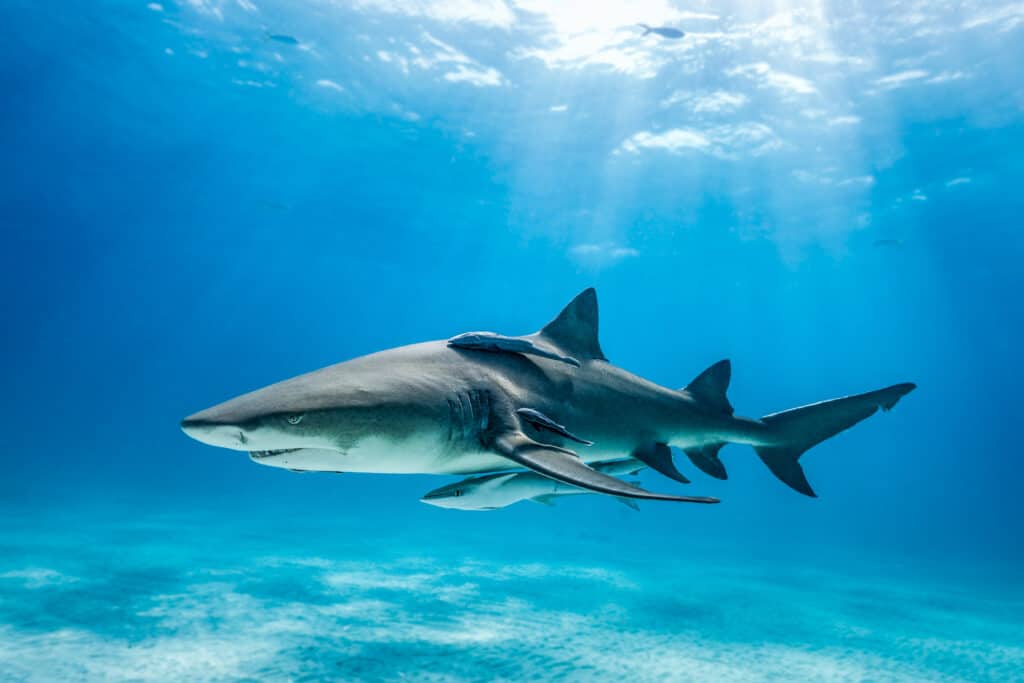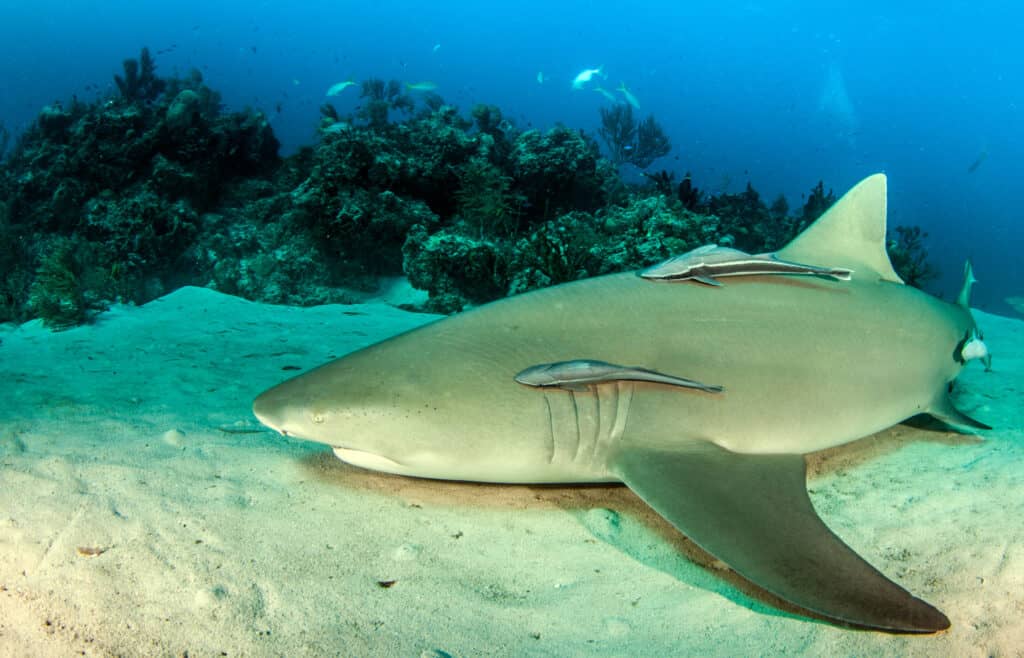Lemon sharks are colorful animals that got their name from their lemon-like appearance. They have only two dorsal fins which make them different from every other type of shark. If you are a lover of nature, you might be interested in seeing these beautiful species yourself. But before you head out on such an adventure, you should know their common locations first. This post shares all the facts you need to know about lemon sharks and their location.
Where Do Lemon Sharks Live?

Lemon sharks are found in parts of the North Pacific Ocean.
©iStock.com/Michael Geyer
Lemon sharks occupy significant parts of the northwestern Atlantic Ocean, from the Gulf of Mexico to the broad waters of the Ivory Coast. You can also find them in parts of the North Pacific Ocean. They adapt well to their environment; this could be a critical factor in their wide distribution.
Lemon sharks have many exciting attributes and facts, but one of them stands out. Among the many shark species, they are one of the few that live in groups. Lemon sharks live in varying conditions and environments depending on the water. They can live comfortably in shallow waters as well as deep waters. They also live around coral reefs, river mouths, and mangroves.
One interesting pattern about this shark species is that they live in any part of the water where they can find food quickly. Geographically, these places of excellent food sources include Southern Brazil, the Gulf of California, and the very popular New Jersey in the United States.
Where are Lemon Sharks Most Common?

Lemon sharks are common off the coasts of Florida.
©iStock.com/Divepic
The most common location to find lemon sharks is Florida. Stories about lemon sharks are pretty popular in Florida. Sadly, not all of them are good news. In fact, the highest number of lemon shark attacks on humans have been in Florida.
The frequency of shark attacks and their regular spottings supports the fact that this state has the highest density of sharks. The state of California is another place where lemon sharks are common.
Do Lemon Sharks Attack Humans?

If unprovoked, lemon sharks won’t attack humans.
©Greg Amptman/Shutterstock.com
Lemons sharks happen to be one of the few species of sharks that do not attack humans unprovoked. There are species of sharks that will attack any human within reach as fast as you can blink and there are those that are gentle towards humans. Lemon sharks have found the perfect balance by combining these two features.
From observation, these fishes are apparently gentle when the environment is friendly. They only become aggressive when there is a need to protect themselves. Their first response to any attack is to run away, and they avoid confrontations with humans.
But do not be misled; lemon sharks will attack if their life is in danger. However, it is interesting to note that these attacks aim to chase away the attacker. There have been more than a dozen cases of lemon shark attacks, and not one of these attacks has been fatal.
Are Lemon Sharks Endangered?
Lemon sharks face the ugly prospect of extinction because they are already considered vulnerable by the IUCN Red List. There are seven stages to help put things in perspective, and the vulnerable stage is the third stage. The stage after this, if their number keeps decreasing, is the endangered stage.
You can say lemon sharks are not yet on the list of endangered species. However, they are just a step from this stage. Many factors have affected their numbers over the years. Let us consider these factors below.
Lemon sharks are shallow dwellers, and like many other species of fish that dwell close to the shore, they are most prone to different types of human influence. This influence includes pollution as a result of waste. The development of coastal areas also affects their natural habitat. The reduction of their prey also significantly affects their number and distribution. But that is not all.
Fishing is another reason these colorful animals are reducing in numbers. The fact that these fish tend to avoid confrontation has done little to prevent heavy fishing of the species. Fishing happens for many purposes. These include feeding purposes, skins for leather, and fins for fin soup.
There are no exact figures, but it is clear that they are not as common as before. Sad reality indeed!
How Long Do Lemon Sharks Live?
When there is no influence from the human world, lemon sharks can live up to 27 years in the ocean. This figure is within the average range of all sharks’ life expectancy. They reach maturity around 10 to 13 years.
Interestingly, lemon sharks keep their young ones deep in the water at the early stages of life. The young lemon shark learns to source food deep in the water near the coral reefs. This method ensures that they live long and have the chance of reaching full maturity.
Lemon sharks also do very well in captivity, unlike some shark species. Being in captivity does not reduce their lifespan in any way.
Lemon Sharks Adaptations
Lemon sharks have exciting features that allow them to adapt nicely to their environment. They live in murky waters and have two distinct adaptations that make them perfect for this place of dwelling.
The first attribute they have is their yellow color, which is the source of their name. The yellow does more than provide the name of the animal. The upper side has a shade of yellow that blends well with the background of the water. On the other hand, the lower side has another shade of yellow to help coordinate with the murky waters. This fish can stay still in the water undetected and continue to feast.
Lemon sharks have lousy eyesight, but that does not stop them. They live in murky waters, so sight is not the most crucial feature in hunting. To adapt easily, they have electroreceptors that allow them see the shapes of things in the water. Even when they can’t see the prey clearly, they know the shape and can use that to identify whether it is a friend or food.
The photo featured at the top of this post is © Yann hubert/Shutterstock.com
Thank you for reading! Have some feedback for us? Contact the AZ Animals editorial team.







